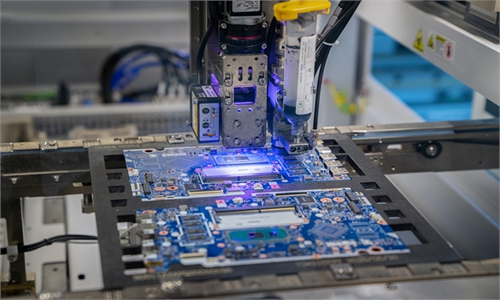Intensified US chip sanctions targeting Chinese tech firms risk disrupting supply chain, will backfire: experts

chip Photo:VCG
US chip giant Nvidia reiterated on Wednesday its commitment to staying in the Chinese market during the release of its fiscal fourth-quarter earnings, showing the firm's strong determination to maintain a presence in the thriving Chinese market, despite the ongoing threat of US sanctions aimed at technology decoupling from China.
The intensified hegemony of the US by waving the stick of economic sanctions against Chinese technology companies has not produced any substantial outcomes but has instead disrupted global industry and supply chains, which will backfire on US companies, Chinese experts said.
Nvidia announced on Wednesday (US time) that its quarterly revenue rose 265 percent year-on-year to reach $22.1 billion. However, it is facing challenges in the Chinese market due to US export restrictions, resulting in a notable decline in data center sales in China.
Nvidia said it is committed to staying in the Chinese market.
"We reset our product offerings to China, and now we're sampling customers in China. We are going to do our best to compete in that marketplace and succeed in that marketplace," Nvidia CEO Jensen Huang stated during an earnings call, highlighting the company's strategy to adapt to Washington's new regulatory environment.
However, the situation has not improved for US companies like Nvidia. Amid the news of Nvidia's results, the Biden administration is reportedly turning up the heat on China's top chipmaker Semiconductor Manufacturing International Corp (SMIC), which is already under sanctions, by cutting off its most advanced factory from more US imports, Reuters reported on Thursday, citing people close to the matter.
Late last year, the US Commerce Department sent dozens of letters to US companies that supply SMIC, suspending permission to sell to its most advanced plant, Reuters reported.
In responding these intensified US moves, a spokesperson for the Chinese Embassy in the US said that "This is out-and-out economic bullying and will inevitably backfire…We urge the US side to stop overstretching the concept of national security and abusing state power to suppress Chinese companies," according to Reuters.
The US pressure on China's semiconductor industry, including essentially exhausting the means available to restrict SMIC, shows that the US has done almost everything that it can think of or is capable of doing, Ma Jihua, a veteran industry analyst, told the Global Times on Thursday.
From this perspective, whether the US just sends smoke signals or actually escalates measures against SMIC, it indicates that the US is somewhat powerless on sanctioning Chinese companies now, Ma said.
Moreover, simply blockading China will ultimately backfire on US companies, experts said.
"China is improving both its chip production capacity and technology, especially in the field of memory chips, while US companies are losing market share in China, which contradicts the goals of the Biden administration's crackdown on China in recent years," Ma said.
In a recent notable shift in China's technology sector, Huawei surpassed Apple to become the leading brand in China's tablet market in the fourth quarter of 2023. It was the first time since 2010 that Apple was displaced from the top position in China's tablet market. This shift came amid a downturn in the tablet market, with Huawei demonstrating remarkable resilience and growth despite challenges from the US, experts said.
Nvidia is another example of how US sanctions may backfire. Although the firm reported impressive fiscal fourth-quarter earnings on Wednesday, its stock prices fell during trading hours, closing down 2.85 percent at $674.72. Nvidia's shares rose in after-hours trading.
Despite exceeding expectations in terms of revenue and profit, Nvidia's shares seem to have priced in some of its prospects amid the Biden administration's reported intensified chip sanctions, which was a major reason for the lackluster performance after the financial report's release, Ma said.
"A bigger concern for the US company, however, would be the potential revenue decline in the Chinese market - the recent chip export ban imposed by the Biden administration may further dampen Nvidia's sales in the Chinese market," Ma said.
As the US continues to restrict exports of high-end artificial intelligence chips to China, China will seek alternative domestic chips, gradually reducing its reliance on US products, Liang Zhenpeng, an industry analyst, told the Global Times on Thursday.
Chinese mainland-based chip companies primarily focus on substituting for Nvidia chips in the medium- to low-end sectors, but that situation may change over time, Liang said.


